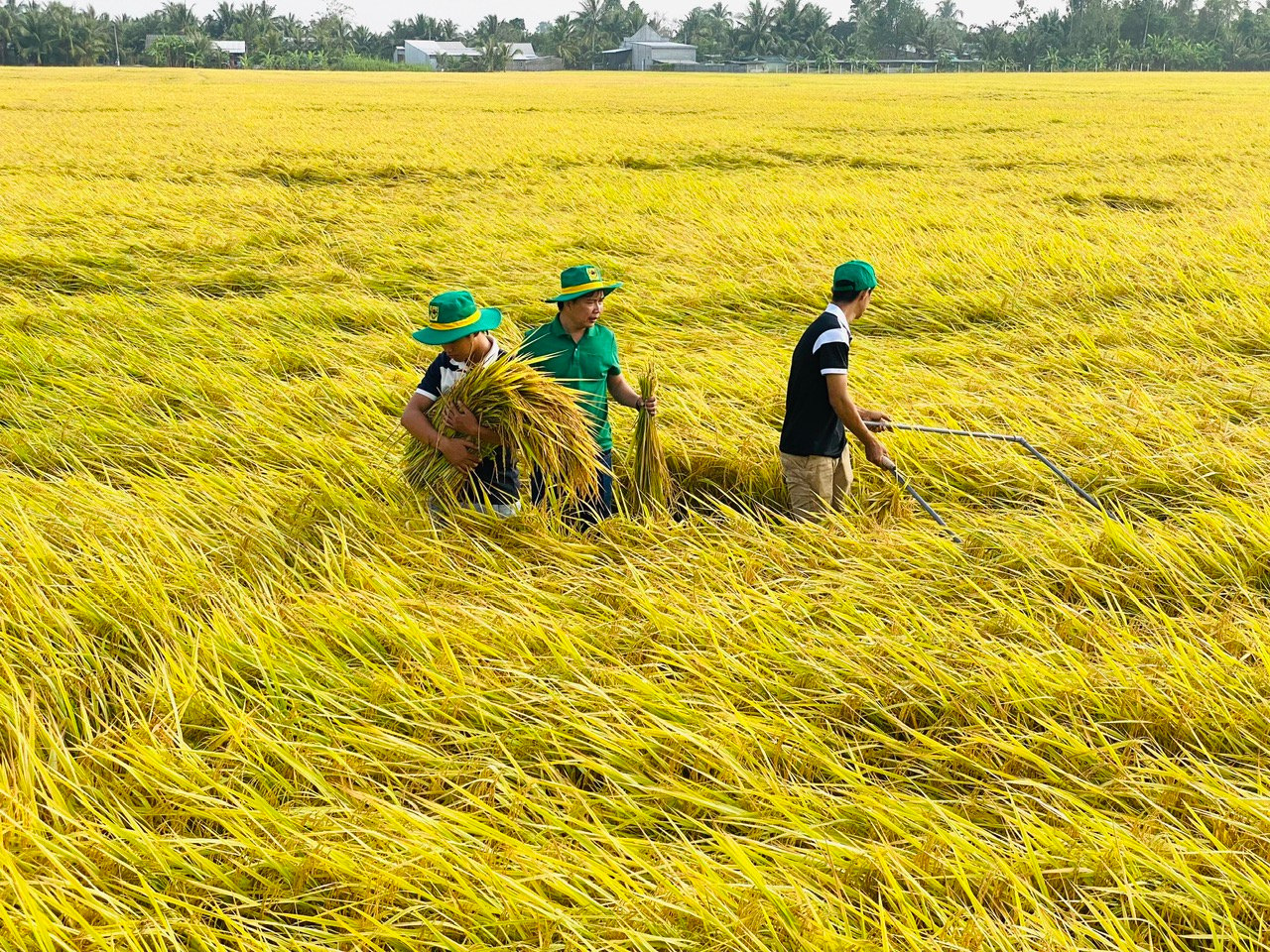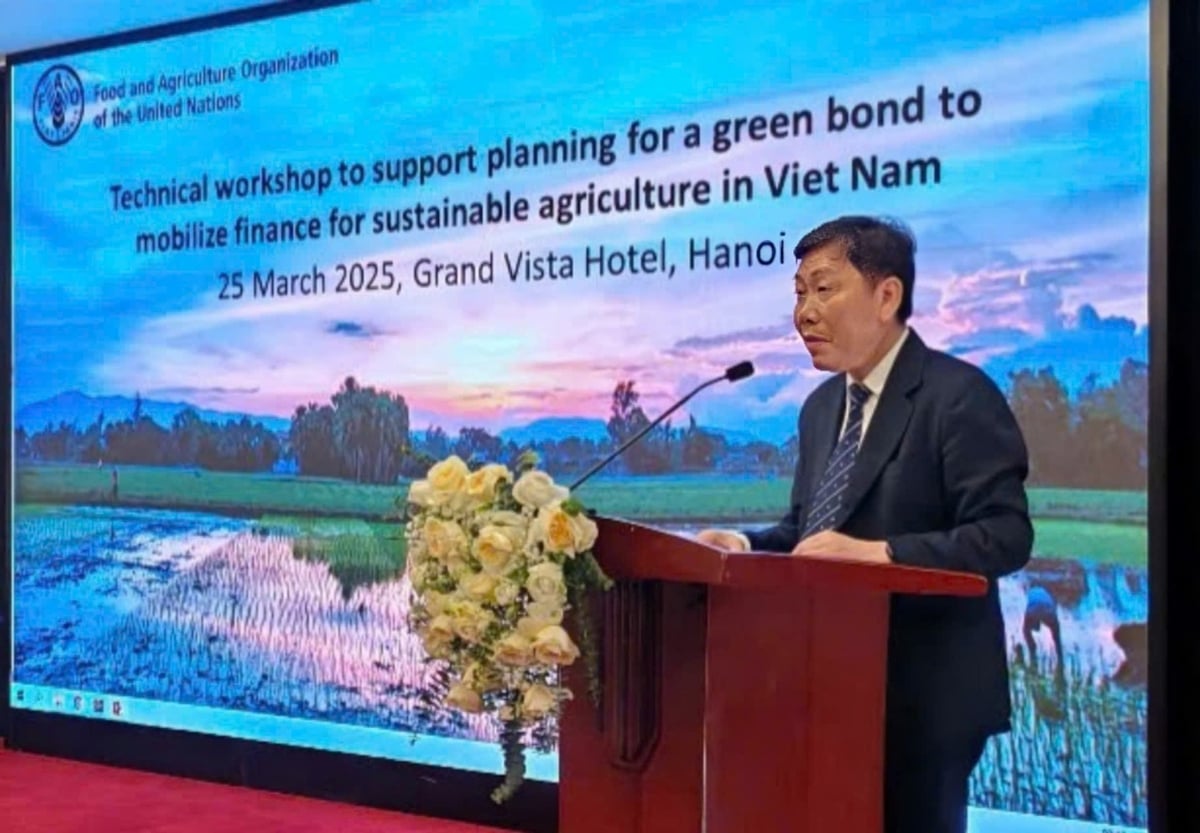May 30, 2025 | 05:22 GMT +7
May 30, 2025 | 05:22 GMT +7
Hotline: 0913.378.918
May 30, 2025 | 05:22 GMT +7
Hotline: 0913.378.918

Representatives from government agencies, financial experts, and development partners gathered to discuss new opportunities for issuing green bonds to mobilize finance for sustainable agriculture. The discussion included support for the Sustainable Development Project of One Million Hectares of High-Quality, Low-Emission Rice Cultivation Associated with Green Growth in the Mekong Delta by 2030. Photo: Hoang Vu/NLD.
Vietnam took a major step in supporting a green finance pathway for its agricultural sector today, as a national technical workshop concluded in Hanoi with strong momentum to support Vietnam’s first green bond for climate-resilient, low-emission farming.
Hosted by the Food and Agriculture Organization of the United Nations (FAO) with support from the Ministry of Agriculture and Environment (MAE) of Vietnam in collaboration with the Climate Bonds Initiative and the Vietnam Bank for Agriculture and Rural Development (Agribank), the "Vietnam Green Bond Workshop Advances Framework for Sustainable Agriculture Finance" convened government officials, financial experts, and development partners to discuss emerging opportunities for a green bond to mobilize finance for sustainable agriculture including the One Million Hectares Initiative —the national flagship program to scale up high-quality, low-carbon rice production in the Mekong Delta by 2030.
In his opening remarks, Dr. Nguyen Do Anh Tuan, Director General of the International Cooperation Department, Ministry of Agriculture and Environment (MAE) emphasized the importance of financial innovation: “Our efforts to transition to sustainable, climate-resilient and low-emission agricultural practices are more important than ever. But achieving this vision will require innovation not only in farming practices but also in mobilizing finance at scale—especially to support our smallholder farmers and agri-SMEs.”

Dr. Nguyen Do Anh Tuan, Director General of the International Cooperation Department, Ministry of Agriculture and Environment (MAE).
Throughout the day, participants engaged in a series of technical presentations and hands-on exercises that directly contributed to shaping the core components of a draft Green Bond Framework for Sustainable Agriculture in Vietnam. These included identifying Use of Proceeds for green bonds targeting smallholder farmers and agri-SMEs, defining eligible investments, and aligning with Vietnam’s climate and agricultural policy priorities.
International case studies—such as sovereign and sustainability bonds issued by Thailand, Indonesia and the African Development Bank for sustainable agriculture —offered real-world examples of how bond proceeds can be structured to deliver both climate impact and rural development. Participants applied these lessons in working sessions that modeled how new green bond guidelines and agricultural criteria can enhance impact and deliver finance at scale for climate-smart agriculture.

Experts contributed their input to the development of the Draft Green Bond Framework for Sustainable Agriculture in Vietnam.
“Unlocking finance for smallholder farmers to adopt new technologies and approaches to deliver low-emission and high-quality rice is a shared priority for FAO and MAE. Collaboration with partners like Agribank and the Climate Bonds Initiative to explore the potential for innovative measures such as food security green bonds in Vietnam is essential for achieving this aim,” noted Beau Damen, Climate Change and Climate Finance Officer for FAO’s Regional Office of Asia and the Pacific.
“Let this be a day of collaboration and shared commitment—to climate action, to sustainable development, and to the prosperity of rural communities and the rice sector across Vietnam,” Dr. Tuan added.
With strong technical input, cross-sector collaboration, and global best practices brought to the table, the workshop represents a pivotal milestone in Vietnam’s efforts to mobilize sustainable finance for agriculture, enhance food security, and contribute to national and global climate goals.
Translated by Dieu Linh

(VAN) The mutual export of agrifood products between the European Union (EU) and the United Kingdom (UK) must occur again without certification, border controls or other red tape. This was agreed at the UK-EU summit.
/2025/05/22/5121-2-173645_677.jpg)
(VAN) NBSAP Tracker identifies strengths and areas for improvement in the National Biodiversity Strategy, based on each region’s priorities and capacities.

(VAN) The draft amendment to the Circular on rice export trading stipulates a periodic reporting regime for rice exporting enterprises.

(VAN) Dong Thap farmers attained an average profit margin of 64% during the summer-autumn 2024 crop (first season), while An Giang and Kien Giang farmers followed with 56% and 54%, respectively.

(VAN) As a doctoral student doing research on renewable energy and electrification at Harvard University, the author shares his musings on electricity, nature, and countryside memories.

(VAN) The decree on Extended Producer Responsibility (EPR) ensures transparent management and disbursement of support funds, avoiding the creation of a “give-and-take” mechanism.

(VAN) Hue City rigorously enforces regulations regarding marine fishing and resource exploitation, with a particular emphasis on the monitoring of fishing vessels to prevent illegal, unreported, and unregulated (IUU) fishing.